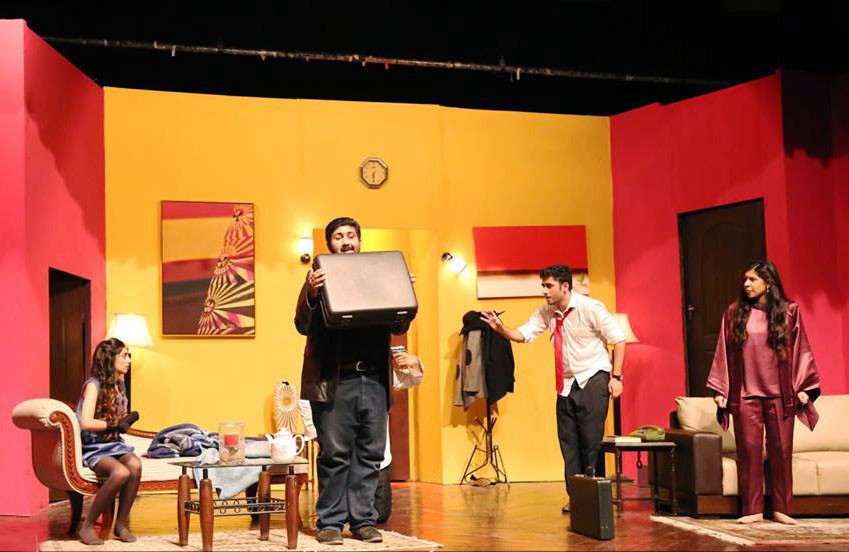
Theatre Therapy’s adaptation of Ray Cooney’s contemporary farce sticks faithfully to the original

Saturday nights are a bliss, meant to give us relief from the wearisome drudgery of the weekdays. The icing on the cake this past weekend was a brilliant theatrical performance I had a chance to treat myself to.
To begin with, it was the play’s funny title -- -- Funny Money -- that attracted me to it. It was only later that I discovered that this was an adaptation of contemporary English dramatist Ray Cooney’s play by the same name.
It is said that Cooney wrote as well as directed his own play when it was staged for the first time at The Churchill Theatre, Bromley, London, in 1994. Cooney himself essayed the role of Henry Perkins, a middle-aged accountant from Fullham with no significant talents.
And, here I was, seated inside a smallish hall of Alhamra, Lahore, waiting to see if the young boys and girls who were part of this amateur adaptation were able to deliver. By the way, they call their group ‘Theatre Therapy’!
This one turned out to be a straight-off adaptation; there was no customisation in terms of characters’ names, for instance, or locations. Director Ahsan Suhail had stuck faithfully to the original script.
When the play opens, the first thing you notice is the living room’s walls that are painted red and yellow. You hear soft tones of classical English music in the background. The mood is all set for the play’s vibrant comedy to unfold itself.
It is Henry Perkins’s birthday night. His wife Jean Perkins has invited their old friends Vic Johnson and Betty Johnson over for dinner. They should be in any minute. Enter Henry, all dishevelled. He has just mistakenly picked up the wrong briefcase in a subway, on his way back home. The briefcase, the audience is told, has oodles of money in it -- £735,000, to be precise.
Henry is sure this is part of some criminal transaction, and he has no intention to keep it, so he decides to leave for Barcelona with his wife and briefcase. Just then they are visited by Davenport, a detective who happened to see Henry with the briefcase at the tube station. Henry, of course, has no idea about this, but he can sense that this might be about money. So, he doesn’t reveal his true self. From here on, you are witness to a farcical show of hidden or mistaken identities. The situation is aggravated by the entry of the Johnsons who Henry introduces them falsely as his relatives from Australia.
Later, another detective, named Slater appears in the play, and makes matters worse for the Perkins’. Again, the way the latter handles the situation makes for the funniest parts of Funny Money. Lies, unattended phone calls, pantomimes, botched up pronunciations, and sexual innuendos -- all add to the hilarity of the play’s basic premise. Bill, the cab driver, with his little jumps, annoying entries and humorous pronunciations increases the public engagement with the play. Vic Johnson, with his hasty prayers and silent expressions, amuses the people. Vic is one character whose lines the audience laughed at the most.
The dexterity with which the actors performed their respective roles was remarkable; how swiftly and neatly they passed through the little spaces between different articles, how the bags were swapped with such agility, how the glasses at the table were not broken in such rush, and the props were set perfectly. Finding all such attributes in a single play made me feel like I was watching one of Charlie Chaplin’s silent comedy skits.
An able cast of characters, led by Sachal Tahseen as Henry Perkins, Afreen Lashari as his wife Jean; Zain Qazi and Maryam Ahmed as Vic and Betty respectively; and Furqan Khan as Davenport, bring the required energy to the performance.
Moving forward without appreciating the wardrobe would be unfair. The two detectives, sober and harsh, Davenport and Slater, wear formal dresses that distinguish them from other characters. Bill’s suspenders went along well with his funny accent. Henry Perkins, the chief character of the play, with his shirt half tucked inside his pants depicted his chaotic state of mind, his joy and apathy at the same time as he found the money. He was indeed one character with immense energy who rarely went off the stage.